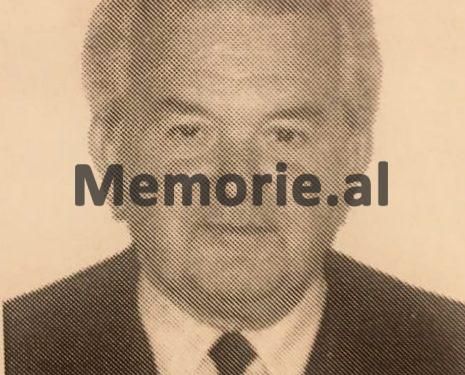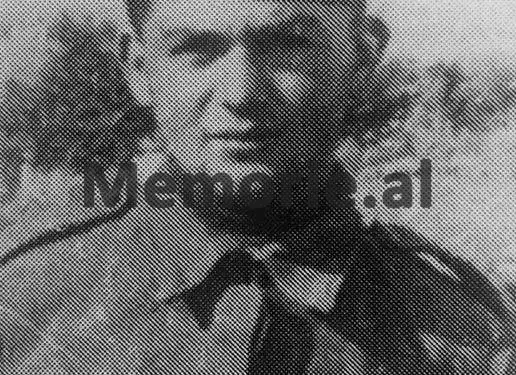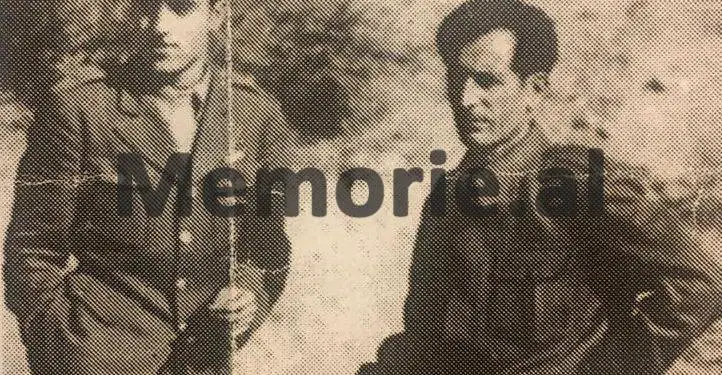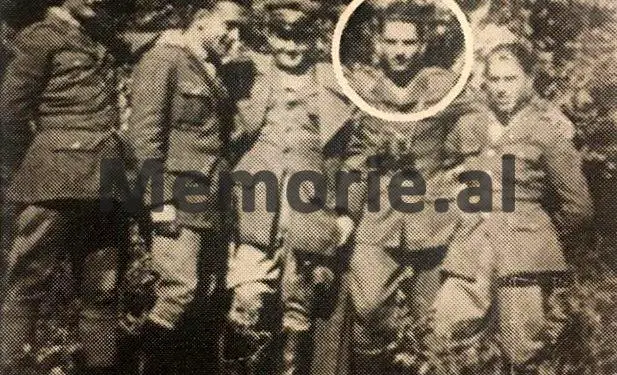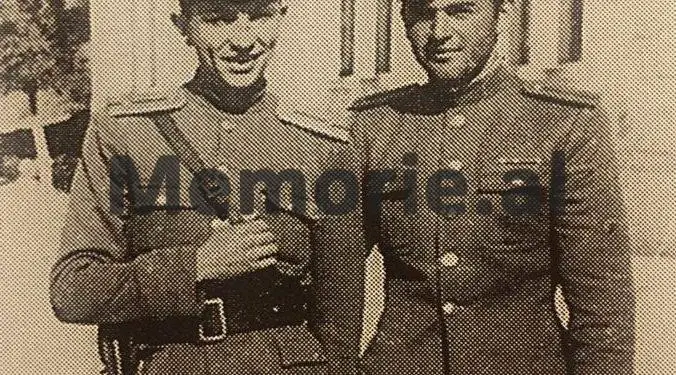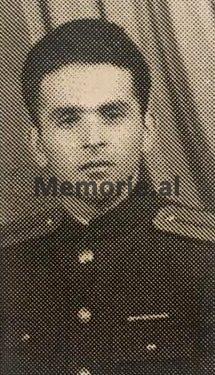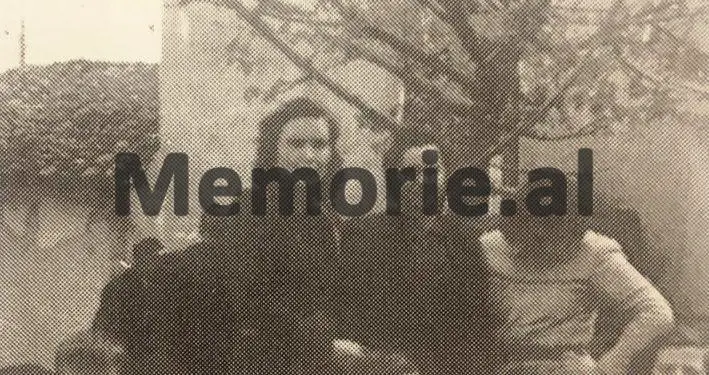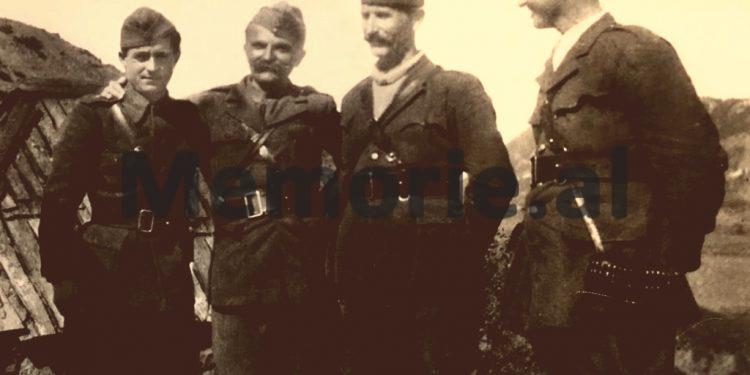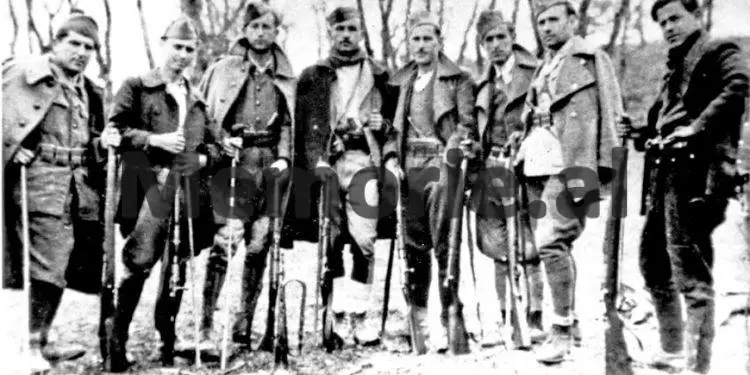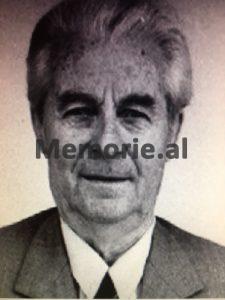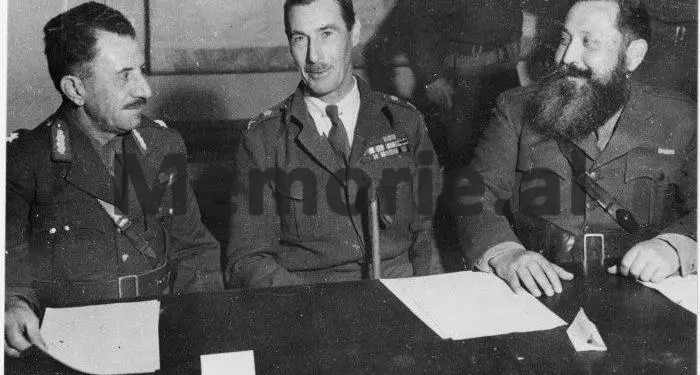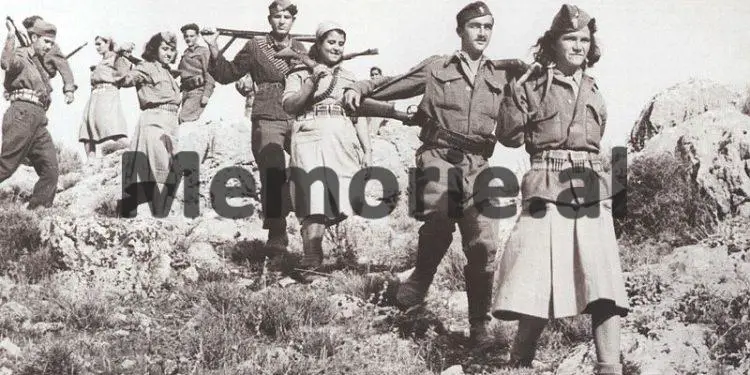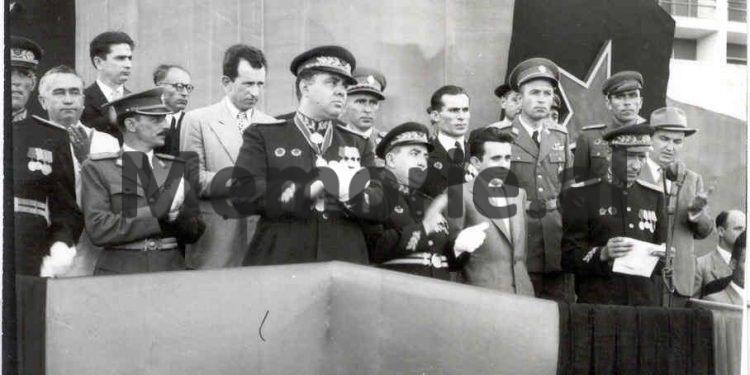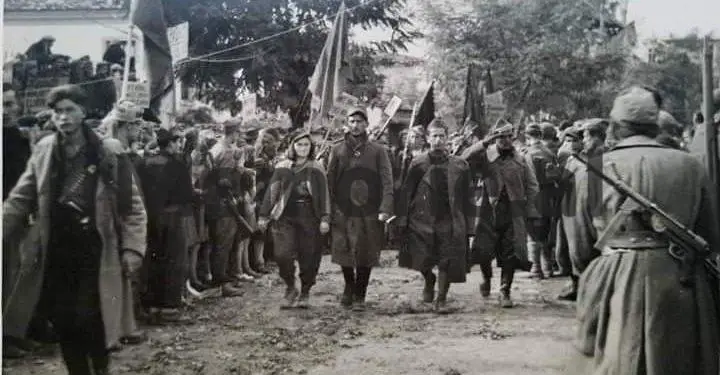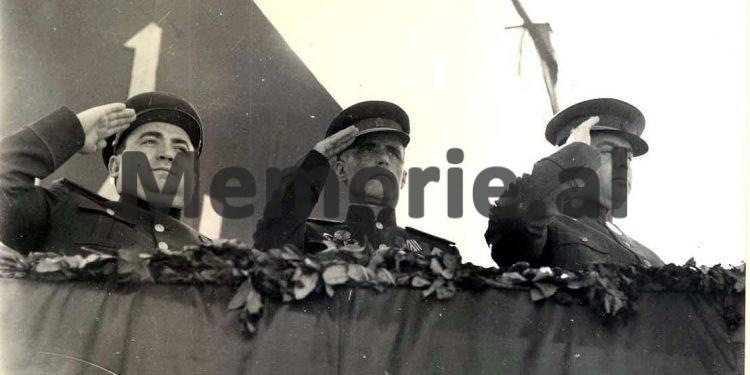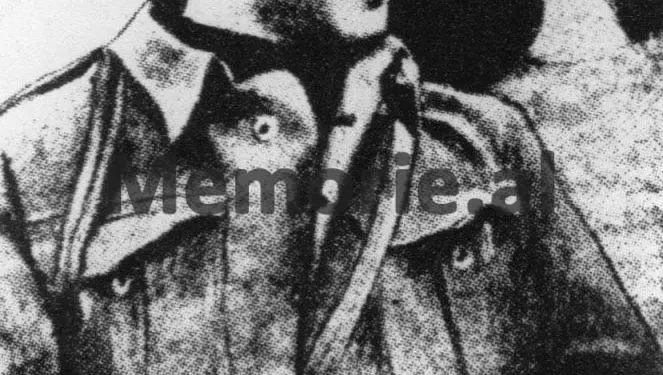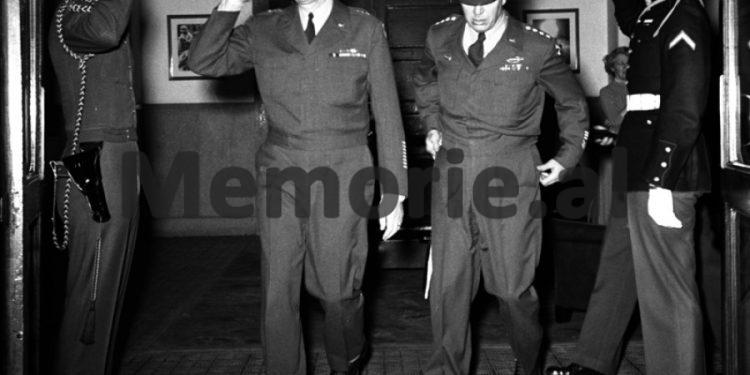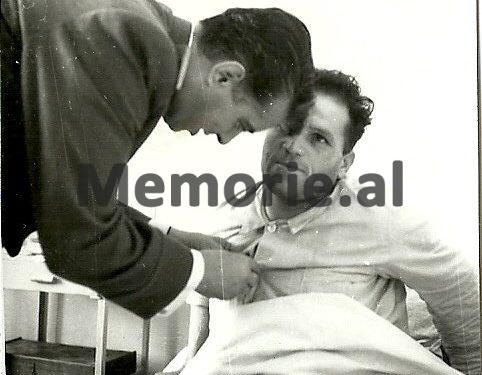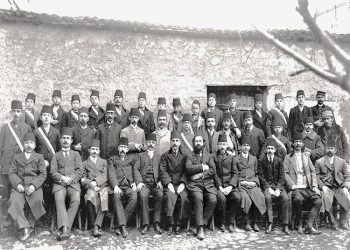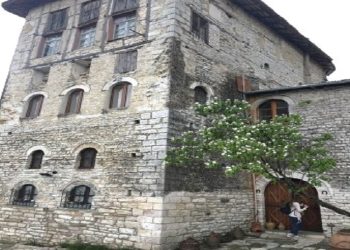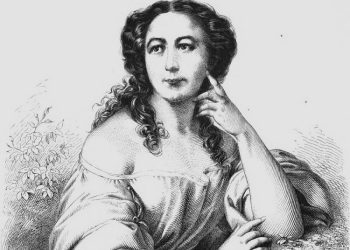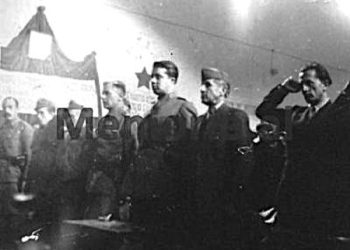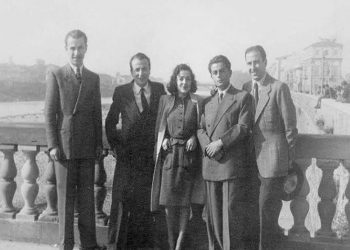Dashnor Kaloçi
Memorie.al publishes the unknown story of Iljaz Lumani, originally from the village of Sanjollas in Kolonja but born in Staboll, who during the war joined the Partisans in the Battalion “Revenge” of Petrit Dume, where during the fighting in August 1943- It was arrested by the Germans and interned in the Thessaloniki prison, where German forces kept several hundred Albanian citizens isolated. Luman’s escape from the German camp and his return to Albania by joining the “Revenge” battalion, where after the end of the war, he was summoned to Tirana and the Minister of Internal Affairs, Koci Xoxe, assigned him a top-secret mission as liaison officer and escort of the top leaders of the Greek Communist Party and their Army, whom he illegally took to some secret bases on Mount Gramoz and brought to Tirana, securing and guarding them in a secret villa on Skënderbej Street. , from where they went to meetings with Enver Hoxha, Mehmet Shehu, Hysni Kapon, Abdyl Këllezi, etc. His arrest following a debate with Mehmet Shehu over some gifts he had received from Niko Zaharjadhis and his wife, his release after a letter to Enver Hoxha and demobilization from the army, after he refused to go as a battalion commissioner in Puka, suspecting that they would physically eliminate him and work three shifts in Tirana’s enterprises until he retired in the 1980s.
In August 1944, when I was a partisan of the “Revenge” Battalion, I fell ill with typhus and the commander, Petrit Dume, ordered me to go to my family. While I was hiding in the village of Bënjë in Radom, I was arrested by the Germans and together with 23 others who were taken prisoner, we were interned in the prison of Ioannina. After eight months in solitary confinement in the Ioannina prison where the Germans did not treat us badly, on April 20, 1944, as I was pouring water on the prisoners, the Nazi soldiers who accompanied us were hit by gunfire by some Greek partisans, and I took the opportunity. and I was able to escape. After that I fled and took refuge in a Greek family living somewhere on the outskirts of Ioannina, which a few days later gave me one of the boys of the house who accompanied me to the Greek partisans, whose squad was in a village in Ioannina. In that platoon of Greek EAM partisans who had Commander Miço and Commissar Jorgon, I was treated very well and I stayed for four months, taking part in many battles it fought against the Germans as in the districts of Konica, Agrinjo, Trikalla. , Mesallonjë, Koshan, etc. This is how Iljaz Lumani remembered the time when he was a partisan of the “Revenge” Battalion, who after being captured by the Germans in August 1943, together with his brother, his father and 21 other partisans, was interned in a prison in Ioannina. from where he managed to escape and join the Greek partisans of the EAM. Who is Iljaz Lumani and what is his past? How did that slave end up in the hands of the Germans, and who was the man who spied on the 23 villagers who had their partisan men who were captured along with him? How was he treated by the Germans in the Ioannina prison and how did he escape? What was the secret task assigned to Luman immediately after the war by Interior Minister Koci Xoxe and his deputy Myftar Tare? What were the secret missions that Lumani carried out for five years on the Albanian-Greek border and who were the top leaders of the Greek Communist Party whom he guarded in the secret villa on Skanderbeg Street in Tirana? Why was Iljaz Lumani arrested by Interior Minister Mehmet Shehu and what was the cause of them? What did Luman ask Enver Hoxha in the letter he wrote to him, and why did Josif Pashko beg him not to leave the army? Regarding these mysteries and other facts unknown to his life and career as a soldier, the former rebel officer of the Ministry of Interior tells us that after asking Enver Hoxha to keep the beautiful promises he had made, he left the Army and ended up working as a tour operator in Tirana.
In the Revenge Battalion
Iljaz Lumani was born on April 23, 1921 in Istanbul, where his father, Nevruzi, had emigrated from Greece where he had been deported after his brother Veipi killed a Turkish officer in his village of Sanjollas in Kolonja. where is the origin of that family? During the war years, the entire Lumani family joined the Anti-Fascist Movement, taking an active part in partisan formations. Regarding this, Iljazi recalled: “Around June 1942, our family connected with the Anti-Fascist Movement through the family of Dylbere Baci in Korça, to which we took weapons. Dylberi spoke to me for the first time about the importance of the War, and at the end of December 1942, I went and joined as a simple partisan in the Kolonja platoon, then led by Commander Petrit Dume and Commissioner Josif Pashko. At the time, the group, since it was small in number, had joined another squadron commanded by Demir Staravecka, and on June 20, 1943, it returned to the Battalion, known as the Revenge. As part of that battalion, I took part in all the fighting that took place, such as the one in April 1943 at the Bazaar of Çarshova, where after ambushing an Italian convoy, we captured 12 captive soldiers and burned six trucks and a car. I also took part in the fighting for the post of Commander of the Fascist Militia, which consisted of 25 soldiers, as well as the post of gendarmerie and Italian carabinieri. The last battle I took part in that Battalion was the one we did to get the Border Post guarded by 12 Albanian soldiers and 12 Italians, commanded by Shefqet Melcka, who later joined the Colony squad. and he became a very good commander of the partisan units “, Iljaz Lumani recalled the period when he fought against the Italians in the partisan Battalion” Revenge”.
Arrest by the Germans
How long did Iljazi stay in the “Revenge” Battalion and how was he arrested by the Germans? In this regard, he recalled: “As part of the Revenge Battalion, I stayed until August 1943, and the last battle I took part in that Battalion was that of Barmash on July 6, against the German forces. Then, from July 10 until the end of August, when I was arrested by the Germans, I was ill with typhoid and was in the village of Bënjë in Radom, after the Battalion Commander, Petrit Dume, ordered me to stay close to my family and he had left me his brother to cure me. At the time I was in that village, the Germans undertook an extensive operation in that province, to discover and strike the bases where the partisans were hiding and sheltering. But even though we were hiding there, we were surrounded by the Germans, after A. Barmashi spied on us and together with 23 others, we were arrested by them “, Iljaz Lumani recalled.
In the German prison of Ioannina
How did the events unfold afterward with Iljaz Lumani and 23 other villagers who were captured there in the village of Bënjë at the foot of Mount Radom in Kolonjë? Regarding this, Iljazi recalled: “The Germans arrested me together with my older brother Vehipi and father Novruz, and together with 23 partisans and other villagers, such as Dule Ismolli, Sulo Selimi, Shahin Temja, Estref Baci Fari Arifi, Dine Rushiti, etc., took us to Greece, crossing the Borozan Bridge, where they left us without bread for four days, and then sent us to the Ioannina prison, which was an old prison that had been built. since the time of Ali Pasha Tepelena. In that prison where we were taken, the Germans kept about three thousand Greeks in custody, and the truth is, we were not treated badly or tortured, but the food was so scarce that we could barely breathe. After staying in that prison for eight months, on April 20, 1944, while I was pouring water on the prisoners, the German soldiers who were accompanying us were shot at by some Greek partisans, and I took advantage of the situation, escaped, and fled. fast in the direction of the outskirts of the city of Ioannina. After I was far away and made sure that the Germans were not following me, I knocked on the door of a Greek family who invited me inside. After they kept me in their house for a few days, I asked them to give me one of their sons to accompany me to the Greek partisans of EAM, who had their bases in the villages around Ioannina. So I left them and the son of that family accompanied me to a village not far from Ioannina where I met the gang of Greek partisans commanded by Niço and Commissar Jorgo “, Iljaz Lumani recalled the escape from the German prison in Greece.
He fights with the Greek partisans
What did Iljaz Lumani do in the EAM Greek partisan platoon commanded by Niço and Jorgo, and how did they treat the Albanian partisan? In this regard, Lumani recalled: “From the first day I went and joined the Greek partisan detachment, and all the time I had been part of that squad for four months, they received me and treated me very well. One of the well-known Greek partisans named Aris Zdrava, who was the commander of a Regiment, as soon as I got there he gave me British military clothes and he kept me close all the time and helped me with everything. Also during that time I met the secretary of the Communist Party of that gang, named Chakalov, who also kept me close so that I would not feel lonely. During the four months, I stayed on that platoon, I took part in all the fighting they fought, fighting alongside Greek partisans against German forces such as: Trikalla, Agrinjo, Koshan, Mesallonjë, and Konica districts. At that time, the Greek partisans of the EAM, although very liberal and did not have the discipline of the Albanian partisans, fought only against the German forces and did not wage a fratricidal war as we did here in Albania. At that time, the Greek partisans had very good relations with the Albanian partisans and they knew the main leadership of the Communist Party, starting with Enver Hoxha, Koci Xoxe, etc., but more than that they knew Koci Xoxen and Lefter Talon, who commanded the minority partisans “. Iljaz Lumani recalled.
Return to Albania
Regarding his return from Greece to Albania, Iljaz Lumani recalled: “After I was escorted by the Greek partisan from Pilkati named Stavri, I left with him and he accompanied me and brought me to the village of Arrëz in Kolonjë. After I arrived in that village and parted ways with Stavr, I went and took refuge in the house of Thoma Illi, whom I had known for a long time. They received me very well and after keeping me in their house for a few days, I asked to leave and they escorted me to another village, from where I returned to the Revenge Battalion where I had been before being arrested by the Germans. in August 1943. After staying for some time in the ranks of the “Revenge” Battalion, I went to a village in Kolonjë, where many partisans had gathered in those days, as the Second Brigade of Beqir Balluku was being reorganized there, after the defeat it had suffered in the German Winter Operation when it had been in the areas of the Tirana Highlands and those of Martanesh. “As part of the Second Brigade, I stood by the liberation of the country, taking part in all the fighting that that Brigade fought.”
Koci Xoxe charges the secret mission
After the end of the war, Iljazi was summoned to Tirana and in January 1946 he was assigned a very special task. In this regard, he recalled: “On that day, a group of officers of 10-12 people came to the Ministry of Interior together with me, and all of us, as we were, were received by the Deputy Minister of Interior, Lieutenant Colonel, Myftar Tare, who was Koci Xoxa’s aide, who, among other things, told us: ‘We have called you to assign you a very secret task and of special importance, which the Party has entrusted to us. You have been elected and will work in the border area of Korça Region, to help the Greek partisans of EAM ‘. After these files that Myftar Tare told us to acquaint us with the new task that was being assigned to us, he also assigned us the special tasks for each of us and the connections we would have. After the meeting with Myftar Taren, we were received by the Minister of Interior, Koci Xoxe, who after congratulating us on the new task, instructed us that for everything we had during our work, we would only contact his assistant, Taren. One of the tasks assigned to me was to establish contacts with the Greek partisans commanded by General Markos Vafjadhis, who had set up their headquarters on Mount Gramoz, to supply them regularly with weapons, food, clothing, and so on. everything else they had for the needs of their war against the government forces of Prime Minister Caldaris. Also, together with some of my fellow officers, I had to take care of the wounded Greek partisans and distribute them to some hospitals that at that time raised apostates for them, as in Voskopoja, and in some other villages of Korça and Erseka. After taking office, I left for the border area assigned to me, where I contacted J. O., who was appointed as the representative of the Ministry of Interior in the Korça Region and was directly my boss. During those four or five years that I worked in that position in the border area on Mount Gramoz, several times I entered and exited the territory of Greece, where a large part of that territory was controlled by EAM partisans. “Every time I entered Greek territory to carry out the various tasks assigned to me, I was called to the Internal Affairs Branch, where I signed a statement that I would not deconstruct the mission assigned to me under any circumstances,” Iljaz Lumani recalled. that period when he was assigned to the Korça Regional Border Area to assist the Greek partisans of the EAM, in the fighting they were waging to overthrow the Government of Prime Minister Caldaris.
The behavior of the Greeks in Congress
One of the top-secret missions assigned to Luman at the time was that of bringing the two top Greek leaders to the First Congress of the Albanian Communist Party to be held in Tirana at the time. For this, Iljazi recalled: “A few days before the start of the proceedings, the First Congress of the Albanian Communist Party in Tirana, my boss, J.O. and instructed me to take EAM Foreign Minister Jani Joanidhis and EAM Army Commissioner-General Vasil Barxhota and bring them to Tirana, as they would take part in the proceedings of the First Congress. According to the order, I went to the border area in the village of Nikolica, where we had set up the permanent secret post office, and after I handed over Joanidhis and Barxhotas, two horses were made available, with which I brought them to the other secret post we had set up. near the village of Dardhë, where a car with which we would come to Tirana was waiting for me. During the trip, at the exit of Librazhd, our car broke down and I entered in connection with the Ministry and informed my boss, Lieutenant Colonel Myftar Taren, who sent us another car, with which we arrived in Tirana without any problems. Joanidhis and Vasil Barxhota attended the proceedings of the First SNP Congress and when they took the floor to greet them, the delegates stood up and greeted them with long applause. During those days when they stayed in Tirana, I accompanied them everywhere and they asked me to walk them to some tourist spots. At their request and according to the order I had from my bosses, I sent them to see the Castle of Petrela, Kruja, Durrës, as well as the tourist spot on Dajti Mountain. They were very pleased with the great help given to them by the Albanian Government and during the conversations, we had they often mentioned this “, Lumani recalled the time when he was appointed to accompany the two main leaders of the Greek high communist leadership since that time. had launched an armed struggle against the prime minister’s government forces, Caldaris, to come to power.
In Cërrik, 60 thousand Greeks
As early as August 1949, Greek government forces launched a frontal attack on Mount Gramoz and crushed Greek EAM partisans, forcing them to retreat into Albanian territory. Regarding this, Luamni recalled: “Back in August 1949, when the partisan forces of the Greek communists of the EAM broke badly and withdrew to the interior of the Albanian territory, I and some of my fellow officers were in charge of organizing them. at various points that were then set up for their reception. At that time, thousands of Greek communists and partisans came to our land, many of whom were with their families. We disarmed them at the border and then with the means that were made available to us, we carried out their transport and distribution, in different areas of Central Albania, such as Elbasan, Kavaja, Durrës, etc. At that time, their General Command, which had been installed on Gramoz Mountain, came to Albania and settled in the area of Cërrik, where the Oil Refinery was built today and the city was built. At that time, the Commander-in-Chief of the Greek Army (EAM), General Markos Vafjadhis, was removed by his party and declared a revisionist, and was replaced by General Vandasi, while Commissioner Vasil Barxhota continued to be, although he was injured in the leg. Koci Xoxe was arrested at the time and replaced by Mehmet Shehu. With the arrest of Koci, Myftar Tare was also arrested, and the task he had assigned to accompany the senior leaders of the Greek Communist Party was entrusted to me at that time. There in Cërrik, I often met with General Vandasi and Commissioner Barxhotas, and for any problems they had, I contacted Kadri Hazbi directly. The Greek refugees who settled in the Cërrik plain, numbering up to 60,000, settled in tents and we organized their defense with soldiers and armed officers whom I commanded. Greek refugees stayed there in tents from August when they first arrived, until December. In December 1949, from Durrës, they sailed to other communist countries in Eastern Europe, which welcomed and systematized them, “Iljaz Lumani recalled, the period when he was appointed to care for the senior leaders of the Greek Army of EAM.
With the Greek leadership in Tirana
In December 1949, when the last Greek refugees who had come to Albania left the Port of Durrës, their senior leadership, who had been staying for five months in tents in the Cërrik field, came and settled in Tirana. Regarding this, Iljazi recalled: “After the Greek refugees from Cërrik fled, their leadership came to Tirana and they settled in a villa on Skënderbej Street, where the embassy of the Democratic People’s Republic of Korea was located. Their placement in that villa was kept top secret and at all times it was guarded by soldiers of the Ministry of Interior. Niko Zaharjadhis, who held the post of First Secretary of the Greek Communist Party, along with his wife, Kukula, and his secretary, Colonel Fereo, also attended the villa. They usually did not leave the villas, and when they had a problem meeting with Enver Hoxha, Hysni Kapo, etc., I communicated with the Director of the Special Directorate of the Ministry of Interior, Neshat Hysi, or Jorgo Kola, and accompanied them to those meetings. In the villa where they stayed, they often came to visit the Minister of Interior and Deputy Prime Minister Mehmet Shehu, Hysni Kapo, Kadri Hazbiu, and Abdyl Këllezi. As early as the spring of 1950, the Political Bureau of the Greek Communist Party and senior military personnel stationed at the secret villa in Tirana prepared to leave Albania. Mehmet Shehu, Hysni Kapo, Kadri Hazbiu, Abdyl Këllezi, etc. took part in the dinner they had last night before leaving. During the dinner, Niko Zaharjadhis presented Mehmet Shehu with a shotgun as a souvenir, while his wife Kukula gave me a fabric suit and a revolver “, Lumani recalled, when he was assigned a secret mission to maintain the leadership of top of the Greek communists who took refuge in Tirana.
Debate with Mehmet Shehu
With the departure of the senior leadership of the Greek communists from Albania, the military career of Iljaz Lumani ended, which he says was the reason for Mehmet Shehu. In this regard, he recalled: “After the Greeks left, I was appointed Head of Sector in the First Directorate of the Ministry of Interior, where I worked with Counterintelligence. After a few days, Mehmet Shehu called me to his office and asked me about a colleague of mine who had been captured in Greece. I replied: I know nothing. You started it yourself in Greece, why do you ask me, when did you deal directly with it ?! Mehmet Shehu was angry with my answer and said to me: Why did you accept the suit and the revolver given to you by Zaharjadhis’s wife, our government does not have a suit and a revolver to give to you ‘?! I replied, “I accepted that gift after I saw you accepting the couple.” Mehmet turned to me: Why are you the same as me? After that debate that lasted even longer, Mehmet Shehu put me in custody for a month and during those days I wrote a letter to Enver Hoxha, where, among other things, I said: ‘Where are those beautiful words,’ I’m doing this task, the Party and the government know how to reward them, ‘you told us in 1946 when you sent us on a mission to the border with Greece’, and I handed the letter to Sami Ormova, who was the commander of the guards in the entry of the Central Committee. After a few days, the Deputy Minister of Interior, Josif Pashko, came to me and asked me what I had written to Comrade Enver, and after he was released from prison, he told me to go to Puka as a Battalion Commissioner. I refused to go there because I knew they would shoot me and kill me”, concluded his story, Iljaz Lumani, who at that time, after handing over the party document and being released from the army, ended up as worker with three shifts in Tirana enterprises, until 1980 when he retired./Memorie.al




